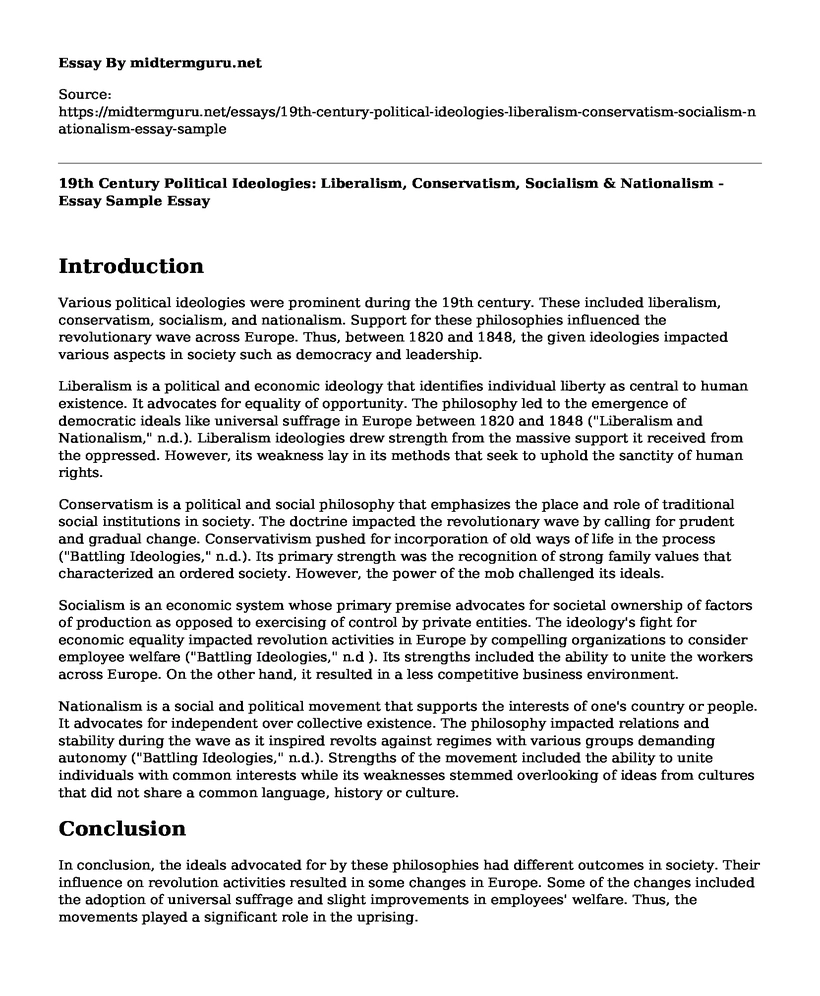Introduction
Various political ideologies were prominent during the 19th century. These included liberalism, conservatism, socialism, and nationalism. Support for these philosophies influenced the revolutionary wave across Europe. Thus, between 1820 and 1848, the given ideologies impacted various aspects in society such as democracy and leadership.
Liberalism is a political and economic ideology that identifies individual liberty as central to human existence. It advocates for equality of opportunity. The philosophy led to the emergence of democratic ideals like universal suffrage in Europe between 1820 and 1848 ("Liberalism and Nationalism," n.d.). Liberalism ideologies drew strength from the massive support it received from the oppressed. However, its weakness lay in its methods that seek to uphold the sanctity of human rights.
Conservatism is a political and social philosophy that emphasizes the place and role of traditional social institutions in society. The doctrine impacted the revolutionary wave by calling for prudent and gradual change. Conservativism pushed for incorporation of old ways of life in the process ("Battling Ideologies," n.d.). Its primary strength was the recognition of strong family values that characterized an ordered society. However, the power of the mob challenged its ideals.
Socialism is an economic system whose primary premise advocates for societal ownership of factors of production as opposed to exercising of control by private entities. The ideology's fight for economic equality impacted revolution activities in Europe by compelling organizations to consider employee welfare ("Battling Ideologies," n.d ). Its strengths included the ability to unite the workers across Europe. On the other hand, it resulted in a less competitive business environment.
Nationalism is a social and political movement that supports the interests of one's country or people. It advocates for independent over collective existence. The philosophy impacted relations and stability during the wave as it inspired revolts against regimes with various groups demanding autonomy ("Battling Ideologies," n.d.). Strengths of the movement included the ability to unite individuals with common interests while its weaknesses stemmed overlooking of ideas from cultures that did not share a common language, history or culture.
Conclusion
In conclusion, the ideals advocated for by these philosophies had different outcomes in society. Their influence on revolution activities resulted in some changes in Europe. Some of the changes included the adoption of universal suffrage and slight improvements in employees' welfare. Thus, the movements played a significant role in the uprising.
References
"Battling ideologies (1815-1830)." (n.d.). Retrieved from https://www.sparknotes.com/history/european/1848/section4/
"Liberalism and nationalism (1789-1871)."(n.d.). Retrieved from https://www.edu.xunta.gal/centros/espazoAbalar/aulavirtual2/pluginfile.php/712/mod_resource/content/3/Unit%202%20Liberalism%20and%20Nationalism%20%281789-1871%29.pdf
Cite this page
19th Century Political Ideologies: Liberalism, Conservatism, Socialism & Nationalism - Essay Sample. (2022, Dec 26). Retrieved from https://midtermguru.com/essays/19th-century-political-ideologies-liberalism-conservatism-socialism-nationalism-essay-sample
If you are the original author of this essay and no longer wish to have it published on the midtermguru.com website, please click below to request its removal:
- Essay on How to Detect Media Bias and Propaganda
- Relevance of the Capital Control Policies - Essay Sample
- Administration in Washington DC - Essay Sample
- Essay Sample on Abusive Relationships
- Ethical Theories - Assignment Example
- Residents of Prinsloo vs Oil Refinery: An Ethical Dilemma - Essay Sample
- Communication: Essential for Survival & Its Cultural Influences - Essay Sample







